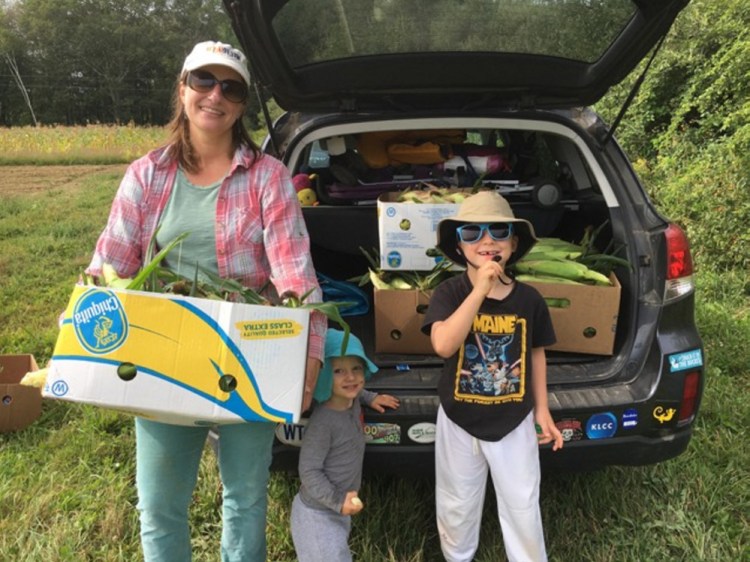As I ripped out spent Sun Gold vines and planted garlic at my Tom Settlemire Community Garden plot in Brunswick last month, food waste piled up in most tracts that could have fed dozens – no, hundreds – salads and soup. Squishy tomatillos entombed in brown husks, untold split, oozing tomatoes, frosted stalks of kale and chard, and verdant patches of parsley. But only 25 percent of our garden’s plot-holders agreed to let volunteers glean an undetectable portion of their ripe excess for area food banks this growing season.
When I evangelize such efforts, otherwise woke citizens will ask: Wait, what is gleaning? We’ve forgotten this ancient, biblical practice, where the poor once had even a legal mandate to collect leftover, economically nonviable crops from farmers’ fields after harvest. I want our Brunswick garden to take a note from behavioral economics, nudging all plot-holders to permit gleaning in exchange for the privilege of borrowing a community plot – rather than leaving the choice up to human generosity.
We food hoarders, and I am one, exhibit the “planning fallacy.” We optimistically overestimate the volume of veggies our family can eat (not to mention chronically underestimate the hours putting up all those quarts of tomatoes and applesauce will consume). But over-gardening is only a sin if you don’t share.
This Thanksgiving, I’m grateful as gleaning comes out of the closet. We celebrated our first (annual) Maine Gleaning Week in October. Year-round and statewide, everyday Mainers now rescue peak-season produce for their neighbors, through a surge of grassroots groups that include the Central Maine Gleaners, Lincoln County Gleaners and Healthy Acadia’s Gleaning Initiatives in impoverished but agricultural-rich Hancock and Washington counties. We’ve sprouted new food bank farms, such as Twin Villages in Damariscotta, that raise crops exclusively for low-income families.
Here in the midcoast, the Merrymeeting Gleaners, formed by the local Food Policy Council and Master Gardeners in spring 2016, has harvested more than 20,000 pounds of free produce this calendar year, arming food pantries with farm-fresh veggies to distribute in their Thanksgiving baskets. This harvest included over 1,000 pounds of apples that volunteers picked at popular Rocky Ridge Orchard in Bowdoin after it closed for the season.
There I scaled the Baldwin ladders with my two boys, age 6 and 2, that Sunday morning, then delivered boxfuls to the Head Start kitchen in Bath, one of 21 sites that the Merrymeeting Gleaners supplies. With my toddler in tow, I also tried, in vain, to glean an overgrown maze of Fairwinds Farm corn in Bowdoinham. Instead, we drove over bushels bound for a summer feeding program at the Georgetown Central School. On occasional Saturdays, we deliver a trunkload of surplus from the Brunswick Winter Market in Fort Andross to the Bath Housing Authority. Gleaning is an easy way for busy families to contribute.
As you pore over January’s seed catalogs, plan to Plant a Row for the Hungry and invite more curious children into your garden next season. From his front-yard urban farm, our Brunswick buddy Ben Walsh processes more than a year’s worth of homemade tomato sauce and frozen kale for his family of three. So come August and September, he invites neighbors over for weekly backyard vegetarian feasts until the produce is gone. He’s done more than anyone to foster community among the bogged-down – but admittedly affluent – families in our neighborhood near Bowdoin College. Ben even hosts an annual Melonfest, inviting a crowd to freely sample the heirloom watermelons and muskmelons he starts from seed and coaxes to ripeness with heat-trapping black plastic mulch.
Let’s reclaim food access as a nonpartisan issue as we break bread together this holiday season. We could all learn from the family of my Oregon Food Bank friend Sharon Thornberry, a gleaning organizer in a state that pioneered such self-sufficient groups run for and by low-income people under President Lyndon Johnson’s War on Poverty.
Sharon grew up on a North Carolina hog farm before her family moved to Iowa amid racial tensions in 1963. There, her father planted quarter-acre gardens to feed others as much as themselves. He always knew which families, black or white, or senior citizens, needed food in his community – and took extra steps to preserve their dignity.
“He would make up baskets of food and leave them on people’s porches,” Sharon recalls. “He’d say, ‘We can’t possibly use all this up: Will you please help us out?’ ” We gardeners and farmers market shoppers could do more to share that bounty, too.
Send questions/comments to the editors.


